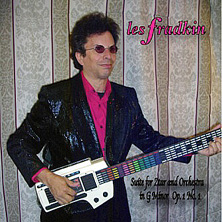 Guitarist
/ composer / vocalist Les Fradkin has a rich history in the music
world going back to the 1970s when he was a member of the original
cast of Beatlemania (with his uncanny guitar skills Les played the
“George” role). Following years away from the music world,
Les returned big time in the early 2000’s with a number of amazing
instrumental guitar based albums followed by a rock opera called
Reality. In the last few years Les has released a number of self-produced
albums of both vocals and instrumentals on his RRO label and in 2013
he steps back in the limelight with his latest all instrumental CD
entitled Suite For Ztar And Orchestra In G minor Op.1 No.1.
Suffice to say, the album is a major sonic breakthrough for both electronic
music and classical music. For his Suite For Ztar And Orchestra,
Les combines 21st century technology enabled by the amazing Ztar
(a futuristic guitar looking creation) and puts a new spin on the
music of Johann Sebastian Bach. What Wendy Carlos did for Bach’s
music on moog synth back in 1969 with Switched On Bach, Les
does for Bach’s music in 2013 on Suite For Ztar And Orchestra.
With its futuristic guitar shaped body, the Ztar is able to recreate
the sounds of a number of musical instruments including 6 and 12 string
guitars, strings and a vast number of other sounds and is combined
by Les adding in more traditional instrumentation including Roland
synths, Rickenbacker guitars, bass and much more. If you thought you’d
heard the last of Bach in a “switched-on” mode and concept,
think again. Somewhere in the heavens above, Johann Sebastian Bach
must be looking down and smiling on Les Fradkin. www.LesFradkin.com
Guitarist
/ composer / vocalist Les Fradkin has a rich history in the music
world going back to the 1970s when he was a member of the original
cast of Beatlemania (with his uncanny guitar skills Les played the
“George” role). Following years away from the music world,
Les returned big time in the early 2000’s with a number of amazing
instrumental guitar based albums followed by a rock opera called
Reality. In the last few years Les has released a number of self-produced
albums of both vocals and instrumentals on his RRO label and in 2013
he steps back in the limelight with his latest all instrumental CD
entitled Suite For Ztar And Orchestra In G minor Op.1 No.1.
Suffice to say, the album is a major sonic breakthrough for both electronic
music and classical music. For his Suite For Ztar And Orchestra,
Les combines 21st century technology enabled by the amazing Ztar
(a futuristic guitar looking creation) and puts a new spin on the
music of Johann Sebastian Bach. What Wendy Carlos did for Bach’s
music on moog synth back in 1969 with Switched On Bach, Les
does for Bach’s music in 2013 on Suite For Ztar And Orchestra.
With its futuristic guitar shaped body, the Ztar is able to recreate
the sounds of a number of musical instruments including 6 and 12 string
guitars, strings and a vast number of other sounds and is combined
by Les adding in more traditional instrumentation including Roland
synths, Rickenbacker guitars, bass and much more. If you thought you’d
heard the last of Bach in a “switched-on” mode and concept,
think again. Somewhere in the heavens above, Johann Sebastian Bach
must be looking down and smiling on Les Fradkin. www.LesFradkin.com
mwe3.com presents an interview with
LES FRADKIN
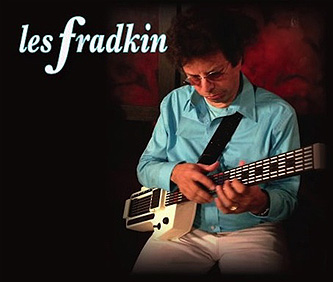 mwe3:
You’ve been living in Colorado for a long time. How did you end
up living there and what do you like about it? How is Colorado different
and do you miss not being in New York or L.A. anymore? I guess New
York City is no longer the place me and you grew up in. Do you ever
visit back there?
mwe3:
You’ve been living in Colorado for a long time. How did you end
up living there and what do you like about it? How is Colorado different
and do you miss not being in New York or L.A. anymore? I guess New
York City is no longer the place me and you grew up in. Do you ever
visit back there?
LES FRADKIN: I've been living in Colorado since 2000. I moved
here because I met Loretta, now my wife, and she's a native of Colorado.
I love the peacefulness of the scenery and the slower pace. I do not
miss New York City at all. As you say, it's not the same place we
grew up in. I've only visited NYC a couple of times since I left back
in 1995.
mwe3: Were you living in the New York area before you moved
to Colorado? When did you meet Loretta, your partner and how would
you describe the chemistry between you and her? What role does she
play in the RRO organization?
LES FRADKIN: I was living in Redondo Beach and Torrance, California
for several years before I moved to Colorado. I was playing in a band
called Get Wet in the South Bay area and I also was touring with Beatlemania.
I met Loretta in late 1999 in Colorado while playing a Beatlemania
gig for a Realtor convention. The chemistry between Loretta and I
was instantaneous and remains incredible. I've never met anyone before
her that has such deep love and concern for what I do, and who I am,
and I, for her and such great marketing intuition. She's a very successful
business woman and that comes into play with RRO. She's a gorgeous
wife, Co-producer, marketer and handles management decisions. Actually,
with respect to decisions, to quote Spinal Tap, "I tart things
up, and she gives me the brutal version!"
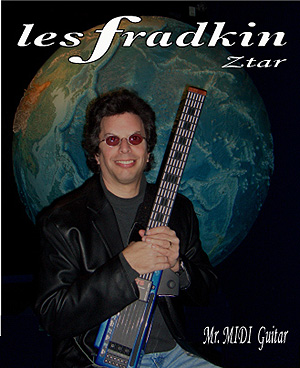 mwe3:
Can you give a little background on your involvement with the Starr
Labs Ztar.
mwe3:
Can you give a little background on your involvement with the Starr
Labs Ztar.
LES FRADKIN: As you know, I did a number of guitar instrumental
albums throughout the early 2000's. I really enjoyed making those
albums but as the decade moved along, the problem cropped up of how
to tour that music without any other band members. The cost of moving
a group around began to become way too steep for this guitarist. Additionally,
I began to feel that I was repeating myself with a formula and that
opportunity demanded some sort of musical change. As such, I waited
for the future to present itself. In 2007, I was surfing YouTube and
came upon a couple of videos from Christopher Currell (ex- Michael
Jackson guitarist) (“Gemini Puzzle Pt 2” - Christopher Currell
In Concert ) and an Italian shred guy, Fabrizio Chiruzzi (“Fabrizio
Chiruzzi Ztar jam part 3”) playing the Ztar and saw some amazing
possibilities for myself. Among those possibilities was the realization
that this new technology could allow me to be a true soloist accompanying
myself onstage with a portable package, at speeds unheard of with
previous MIDI Guitar technology. You know, after 30 years of playing
pitch to Midi systems, I got tired of having to play on top of the
beat to have the notes appear "on time".
After purchasing my first Ztar in May, 2007, I began the process of
trying to learn it. Harvey Starr, the Inventor of the Ztar, and many
other end users played it like a glorified piano. I felt, intuitively,
with previous experience with the SynthAxe, that some other approach,
given the multiple note polyphony on each "string", might
hold more promise, for myself, at least. After reading the manual
over 2 dozen times, I soon discovered that, since every note on the
instrument could be tuned to any pitch, or group of pitches, in any
sequential order, I could invent my own personal playing method and
approach the 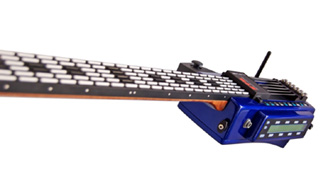 instrument
as a one man orchestra. I started to interact with Harvey Starr to
improve the instrument for musical performance and we became close
friends as a result. In 2008, I released my first full length Ztar
album One Link Between Them which features "Lift Off",
an original composition, loosely based on Bach's "Prelude No.
2 in C Minor". "Lift Off" is, however, in the key of
A minor and features a number of Midi Guitar innovations for technique,
previously impossible on pitch to midi systems. As I moved forward
with my technique, I began to manifest more specific Baroque stylings
in my lead synth approach. I always had those and moved on to my 2009
release Baroque Rocks! which featured a number of Vivaldi and
Bach and Handel works arranged for symphonic rock style orchestrations.
My personal favorite on that album is my new composition for "Canon
In D" which features a new Top line melody over the traditional
Pachelbel score, arranged for rock instrumentation. It sort of has
a "Classical Gas" type approach.
instrument
as a one man orchestra. I started to interact with Harvey Starr to
improve the instrument for musical performance and we became close
friends as a result. In 2008, I released my first full length Ztar
album One Link Between Them which features "Lift Off",
an original composition, loosely based on Bach's "Prelude No.
2 in C Minor". "Lift Off" is, however, in the key of
A minor and features a number of Midi Guitar innovations for technique,
previously impossible on pitch to midi systems. As I moved forward
with my technique, I began to manifest more specific Baroque stylings
in my lead synth approach. I always had those and moved on to my 2009
release Baroque Rocks! which featured a number of Vivaldi and
Bach and Handel works arranged for symphonic rock style orchestrations.
My personal favorite on that album is my new composition for "Canon
In D" which features a new Top line melody over the traditional
Pachelbel score, arranged for rock instrumentation. It sort of has
a "Classical Gas" type approach.
mwe3: How did that, in turn, lead you to the making of your
2013 Suite For Ztar And Orchestra CD?
LES FRADKIN: I wanted to compose an extended work completely
intertwining classical and progressive rock approaches. I had already
recorded quite a bit of Vivaldi so J.S. Bach seemed like the logical
choice, given my Baroque inclinations. Bach invented many chord progressions
that are still in use today in rock 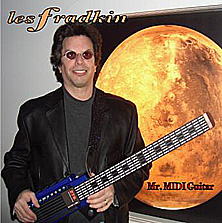 culture.
It took 4 years to complete the new CD because I had to continue to
develop new ways to play the Ztar interactively with a computer to
realize the results you hear and I had to learn to use Ableton Live
and Reason which were new technologies for DAW software that could
be used, in tandem with the Ztar to create utterly random wonderfulness.
The unexpected is always, the “acorn of inspiration”.
culture.
It took 4 years to complete the new CD because I had to continue to
develop new ways to play the Ztar interactively with a computer to
realize the results you hear and I had to learn to use Ableton Live
and Reason which were new technologies for DAW software that could
be used, in tandem with the Ztar to create utterly random wonderfulness.
The unexpected is always, the “acorn of inspiration”.
mwe3: You’re still playing regular guitar on the new CD
too right?
LES FRADKIN: Yes, there is some guitar on the album as well:
Rickenbacker 12 string, Fender Stratocaster and Rickenbacker bass
all play various cameo roles, here and there. Mostly rhythm section
parts. However, as with Bach, the emphasis is with various counterpoint
lines, intertwining together to create a polyphonic whole.
mwe3: So how would you compare the range of Ztar type instruments
that the company has created and which model do you play?
LES FRADKIN: There are several models available - some shaped
like a Strat or PRS, others, more unconventional, such as The Clipper
which features a lighted fretboard or my Z7s model which is a cross
between a SynthAxe and a Steinberger. I play a Ztar model Z7s-XPA.
It features a number of performance enhanced sensors - Ribbon controller,
volume and mixer controls, 6 rubber touch cap pads, neck strip sensor,
6 string triggers, 4 way joystick, USB wireless, multiple step sequencers
onboard, as well as custom colored fret buttons (frets 13 thru 24)
which can be used, among other things, for controlling clips in Ableton
Live computer software. Since the fret board has buttons and no strings,
string bending and vibrato is done with the neck sensor and the joystick.
The response is instantaneous and there is no tracking delay.
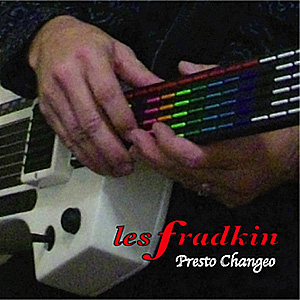 mwe3:
What is the process of recording such a wildly innovative instrument?
mwe3:
What is the process of recording such a wildly innovative instrument?
LES FRADKIN: I generally tap the Ztar like one would a Chapman
Stick. But I also use the string triggers, when I need to emulate
a classical or electric lead guitar. I record each line, one overdub
at a time. Generally, a chordal sketch or top line melody, followed
by accompaniment. For example, when I'm recreating a Bach score, I
record that first to a click track, and then I layer on the rock accompaniment.
This is the reverse of how rock bands generally handle classical influence
or orchestral arrangements. I like to work in small sections, and
then assemble the sections linearly for final mix down. This approach
gives me the opportunity to assemble intros and outros which only
become apparent after the work is done. Each composition has to be
programmed for tuning, synth setup, sonic choices, response curves
and where on there fretboard it can/might be played. This requires
in depth knowledge of the MIDI spec and takes great patience. It is
not for the MIDI faint of heart.
mwe3: And what role does the computer play or is the computer
built in? I dare not think about the vast microwaves coming off that
wireless antenna! (lol) I guess, nowadays this is the laptop studio
generation.
LES FRADKIN: There is a very sophisticated computer built into
the body of the Ztar. It's used to program MIDI setups, response curves,
program changes, zones, etc. I always record to Ableton Live and /
or Digital Performer on a Mac Mini Quad Core. For the suite, I also
recorded with Reason 7. It has a number of special effects, unique
to that program which became intrinsic to the compositional approach
of the Suite. For live, I use a MacBook laptop with Ableton
Live which operates the Clip cues and busses the various synth and
mellotron sounds across 15 MIDI channels. Channel 16 is reserved for
Clip cueing, and other MIDI functions in Ableton Live. I do not use
wireless in the studio since it's unnecessary, only on stage. The
real programming challenge comes when preparing the Ztar for a live
performance of my stuff. It generally takes 8 hours per tune to prepare
the programs which routinely contain as many as 16 to 32 zones. I
have to program zones to organize where things could be played, with
comfort. Often, I'll alter the scale tuning if I don't have enough
frets in a particular zone or use 3 or 4 nested tuning maps to play
chordal accompaniment on a single series of buttons across a single
fret. You can't do that with a conventional guitar. Of course, constant
practice must be a regimen every day, since maintaining Ztar technique
and speed requires vigilance and dedication to craft.
 mwe3:
Where does it end Les? (lol)
mwe3:
Where does it end Les? (lol)
LES FRADKIN: Who can say? Probably merging man with technology.
My interaction with the Ztar is the latest stage of that process for
myself.
mwe3: You have said that Johann Sebastian Bach was a big influence
on you when you were young. When did you first listen to Bach and
how were you exposed to him and how would you compare Bach’s
influence on 20th century rock musicians as well as other musicians
of his own era?
LES FRADKIN: Bach was introduced to me by my mother who was
a classical concert pianist. I loved Bach's work immediately. It spoke
to me, as did Mozart, Paganini, Vivaldi and other classical and Baroque
composers. When The Beatles, The Left Banke, Procol Harum, The Moody
Blues and other groups came along, I saw that classical, baroque and
rock could be effectively combined. I wanted that synthesis for my
own music. I do think that JS Bach was, arguably, the greatest composer
of all time and he influenced, and was influenced by the musicians
of his day. That said, I think his influence still reverberates, even
today.
mwe3: How would you describe the meaning of Bach to a layman?
LES FRADKIN: Bach invented modern counterpoint AND had great
emotional feeling in everything he wrote. But there's an order an
a logic to what he did. All modern pop and rock chord progressions
originate with him, by way of example. And all keyboard technique
used in modern music harks back to him as well.
mwe3: And so why did you choose to cover Bach’s two and
three part inventions on the Suite For Ztar And Orchestra CD?
LES FRADKIN: Actually, I didn't. Bach's invention No.8 in F
Major is included as a sort of "Eleanor Rigby" type interlude
in the Suite. No other inventions are used. For the most part,
I chose solo violin sonatas, double concertos, Brandenburg concertos
and toccatas for my selections. The (lead off track) "Presto",
for example, never had any accompaniment in the original composition.
And the "Presto", among other things, provides a great example
of my personal style and approach.
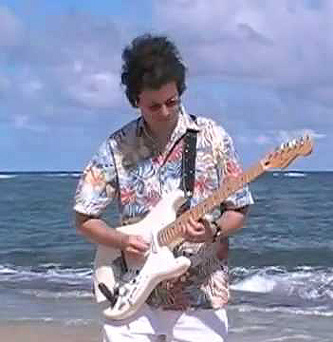 mwe3:
Walter Carlos was another musical pioneer who first coined the term
“Switched On Bach” back in 1969. Were you influenced by
Walter Carlos who in 1972 became Wendy Carlos and what did you extrapolate
from those Carlos Switched On Bach albums?
mwe3:
Walter Carlos was another musical pioneer who first coined the term
“Switched On Bach” back in 1969. Were you influenced by
Walter Carlos who in 1972 became Wendy Carlos and what did you extrapolate
from those Carlos Switched On Bach albums?
LES FRADKIN: Actually, if memory serves, Columbia Records may
have coined the term and Walter was already in "transition"
to Wendy at the time of the album's release. It was, I imagine, a
time fraught with enormous difficulties for her in those days. But
that's a private matter for her, I think. Yes, Switched On Bach
was a big influence as evidenced by my current use of an Arturia Moog
Modular V, for example. But unlike Wendy, who could not perform her
masterpiece live, I can perform some of this Ztar music on stage,
and do. Mainly, "Switched On Bach" proved to me that electronic
classical music had warmth and viability in pop culture. My Suite
offers, I hope, an extension of that trendsetting example.
mwe3: Seems like 45 years later... have you shown the CD yet
to Wendy Carlos?
LES FRADKIN: No, not yet. But I intend to gift it to her for
Christmas. Hopefully, she'll like it. I consider her one of the greats
of synthesis.
mwe3: Did you add any new orchestrations to these Bach tracks?
You mentioned in the first track “Presto” you added fresh
orchestrations. How is it possible to improve on Bach’s original
concepts while bringing his music further into the symphonic / instrumental
rock world?
LES FRADKIN: Yes, I added orchestration on all tracks, and
in some cases, composed variations, and / or completely new melodies.
Some of the intros ("Presto", "Brandenburg's 3&5")
are new and the "Presto Varaitioni" (Presto Variations in
Italian) takes that work to new territory. In my personal opinion,
no composer's work is an ultimate "Holy Grail". Bach, himself,
often wrote variations on the works of other composers. Today, particularly,
in electronic dance music, you see and hear mash-ups, sampling and
intertwining of found music, excerpts from other recordings and a
general blend of various influences. That attitude serves as a perfect
example of some of my thought process with respect to Bach and as
his work is in the public domain... I'm respecting copyright.
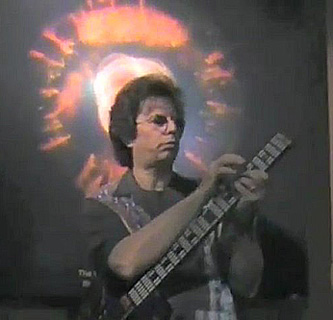 mwe3:
You mentioned that your Suite For Ztar And Orchestra is a first
for the classical music genre. How so and how has the “classical
music community” reacted and embraced your new Bach concepts?
mwe3:
You mentioned that your Suite For Ztar And Orchestra is a first
for the classical music genre. How so and how has the “classical
music community” reacted and embraced your new Bach concepts?
LES FRADKIN: Well, it's the first "Classical" work
ever composed for the Ztar. Like Paganini before me, I like to compose
works, specific to my personal instrumental technique and approach.
He, as you may know, did this with the 24 violin caprices. Many critics
and classical music enthusiasts, at the time, could not believe that
Paganini could actually execute his passages with such grace and ease.
They were considered, at the time, impossible. Yet he played them,
and played them consistently with a spectacular technique which opened
up the now, modern approach, to violin playing. Perhaps, an examination
of his unconventional violin tunings might have yielded more belief
in the ears of his audience because Paganini did NOT tune the violin
in a conventional manner. I am doing the same for the Ztar which uses
certain new scales and tunings which were, heretofore, impossible
on conventional instruments. That said, the Suite is a one
man orchestra work. One doesn't see too many classical musicians,
if any, playing all the instruments on a recording, in this manner
and no one classical soloist certainly can not reproduce a complex
orchestral work as a one man show. While one man bands are not uncommon
in rock, i.e. Paul McCartney, Stevie Winwood, Todd Rundgren, Roy Wood,
and myself, etc...
I have not heard of classical music being handled in this manner.
For what it's worth, many in the classical community have embraced
this warmly with enthusiasm. I have over 80 Orchestras and conductors
and classical musicians following me on Twitter and Facebook. Actually,
most of my fans are Progressive Rock enthusiasts.
mwe3: Is there any way you compare the guitar sounds of the
Ztar to your more traditional guitars and guitar sounds?
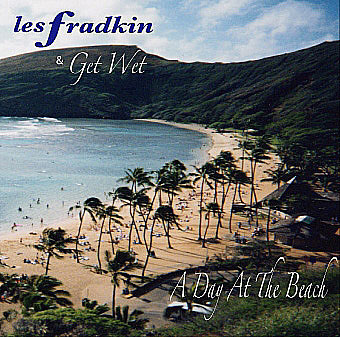 LES
FRADKIN: I don't know if "comparison" is a fair characterization
since the Ztar is just a controller and makes no internal sounds of
its own. I have sampled classical guitar, Rickenbacker 12 string,
Fender Stratocaster, etc. And I have played these sounds from the
Ztar. They tend to take on a slightly different character, when played
this way. I adapt these sounds, accordingly to realize the end result.
Sometimes, they take on an entirely electronic character, as with
the first sounds in the arpeggiated intro of "Presto". Sometimes,
they sound similar to normal guitars, as when the guitar solo comes
in, prior to the introduction of the main theme. On my Hyper Midi
Guitar album, released in 2010, I explored using the Ztar to recreate
conventional classic rock sounds. Of particular note on that release
would be "Sabre Dance", Jeff Beck's "Situation"
and King Crimson's "21st Century Schizoid Man". I think
I nailed those especially well.
LES
FRADKIN: I don't know if "comparison" is a fair characterization
since the Ztar is just a controller and makes no internal sounds of
its own. I have sampled classical guitar, Rickenbacker 12 string,
Fender Stratocaster, etc. And I have played these sounds from the
Ztar. They tend to take on a slightly different character, when played
this way. I adapt these sounds, accordingly to realize the end result.
Sometimes, they take on an entirely electronic character, as with
the first sounds in the arpeggiated intro of "Presto". Sometimes,
they sound similar to normal guitars, as when the guitar solo comes
in, prior to the introduction of the main theme. On my Hyper Midi
Guitar album, released in 2010, I explored using the Ztar to recreate
conventional classic rock sounds. Of particular note on that release
would be "Sabre Dance", Jeff Beck's "Situation"
and King Crimson's "21st Century Schizoid Man". I think
I nailed those especially well.
mwe3: Looks like you’ve given up guitars now that you’ve
embraced the Ztar so fully?
LES FRADKIN: No, I haven't "given up" guitar. I have
just tried to take the art of MIDI guitar to a whole new level. That
said, I play Ztar, almost all the time. It's so complex that it requires
a devotion to one's craft, if you will. It opens up so many new gates,
that it's addictive. And when I perform, it's the Ztar that I take
to the gigs. It's what's needed to realize a modern exciting electronic
performance of my current music and it's what fans expect, now that
the videos on YouTube are out there.
mwe3: What’s new in the “regular” guitar world
for you these days?
LES FRADKIN: Nothing. When I visit Guitar Center, I pay no
attention to the guitar department. It has no relevance to my current
thinking and I have all the guitars I will ever need. As for current
active guitarists, I love Yngwie Malmsteen, Steve Vai, Joe Satriani,
Robert Fripp and Jeff Beck. When I play guitar, it's strictly for
recordings and I usually choose one of my Strats on hand played thru
a Roland VG-8EX V-Guitar System. I guess, with respect to “guitar”,
I'm tech minded! (lol)
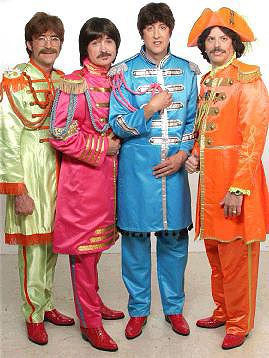 mwe3:
Do you think that conventional guitars will one day be a thing of
the past? Say in one hundred or two hundred years... 2100 or 2200?...
mwe3:
Do you think that conventional guitars will one day be a thing of
the past? Say in one hundred or two hundred years... 2100 or 2200?...
LES FRADKIN: Hard question to answer. Who knew, even 50 years
ago, that we'd be where we are now? I'm more concerned about seeing
young people learning to "play" instruments instead of pushing
buttons than I am about what specific instruments or devices they
might be playing.
mwe3: Looking back in time, you were famous for being in the
1977 Broadway Beatlemania show with Mitch Weissman, Joe Pecorino
and Justin McNeill. It must have been so great looking back on it.
I did meet Mitch on Facebook...
LES FRADKIN: "Beatlemania" is a great memory. We
made history and I'm proud of what we collectively accomplished. We
were a great team.
mwe3: Has that original cast soundtrack ever come out on CD
and was there anything filmed of those shows?
LES FRADKIN: I do not recall the Cast LP coming out on CD.
Filmed? Yes. (“Making of Beatlemania”).
mwe3: Do you know what John Lennon thought of the Beatlemania
show? It’s great that at least I believe he was aware of it all
before he was gunned down. I remember you telling me you back then
met John Lennon on the East Side back in the late 1970s. Do you recall
that?
LES FRADKIN: He told me he liked the show. He said we saved
him the trouble of dealing with a Beatles reunion! LOL! Whether or
not he saw it, I can't say. But, after I opined to him that I might
be typecast after the show closed, he did say to me: "Yes, once
you've been a Beatle, it's hard to get out!" I'll take that as
a compliment.
mwe3: What do you remember most about John Lennon these days?
It just destroyed the city as I recall it. It’s like been 33
1/3 years since he’s gone. 33 1/3 revolutions later.
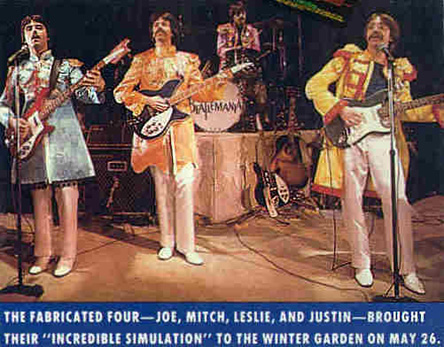 LES
FRADKIN: Remember most? Genius songwriter, great singer, pop culture
icon, inspiration for me... His passing was a sad day and a needless
tragedy.
LES
FRADKIN: Remember most? Genius songwriter, great singer, pop culture
icon, inspiration for me... His passing was a sad day and a needless
tragedy.
mwe3: How is your label RRO Entertainment? Are you planning
to expand the label at some point and feature other artists? When
I think of you in Colorado, for some reason picture you recording
out in a big ranch miles from nowhere! (lol)
LES FRADKIN: The label is just fine. We have a large catalog,
which includes Firefall, Edison Lighthouse, Amber Gomez, Napoleon's
Ghost, The Dirt Surfers, Venus In Bluejeans, Get Wet and a four volume
Byrds tribute series which features a number of name artists. I always
record at my personal studio. I prefer the privacy.
mwe3: Do you have an exact number on the amount of albums you’ve
released as a solo artist?
LES FRADKIN: Currently, I believe I've released 20 solo albums
and 9 solo singles / EP's.
mwe3: Do you still get royalties from that song you wrote "La
Chanson des Souvenirs (“Song
Of A Thousand Voices”) that was covered by Mireille Mathieu?
You wrote that during the time you worked with MGM Records.
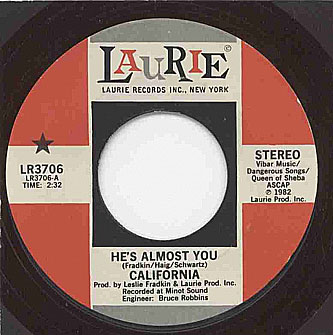 LES
FRADKIN: Well yes, I still get royalties. And I should know, because
I got the publishing back from EMI Music, who held it for decades.
So now, I get paid directly.
LES
FRADKIN: Well yes, I still get royalties. And I should know, because
I got the publishing back from EMI Music, who held it for decades.
So now, I get paid directly.
Actually, I wrote that song far earlier, before MGM. But it saw its
first commercial release there. It was also a hit for Roberto Jordan
on RCA in 1972 and it appears on his three disc greatest hits collection.
mwe3: What ever happened to MGM?
LES FRADKIN: Whatever happened to MGM? Mike Curb. His policies
for that label took it in a direction away from contemporary rock
culture. A policy that I felt was short sighted. But, although I raised
this with him, I was a young artist at the time and I suppose he felt
he knew better. History proved otherwise but hindsight is always 20/20.
mwe3: Another historic flashback, what was it like working
with Laurie Records back in the early and mid 1970s? Was it the same
Laurie Records that had Dion, The Chiffons and The Royal Guardsmen
during the 1960s?
LES FRADKIN: It was that same Laurie Records which had those
hits in the 1950's and 1960's. I produced, wrote, arranged for various
artists for them from 1973 thru 1987 and was also in a group called
California which recorded frequently over those years for Laurie.
It was, to say the least, an interesting experience. Worked with Barry
Winslow and The Royal Guardsmen as well, primarily, with Gene Schwartz
as a co-producer. My most vivid memory was the California recording
of “Summer Fun Medley” (Beach Boys medley), the 100 hours
it took to record and mix it and the exposure on American Bandstand
that resulted from that record. Fun times!
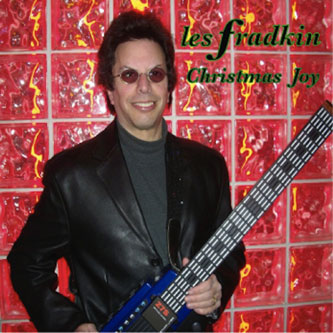 mwe3:
Also it’s ten years since your rock opera Reality. One
highlight, “Everything Is Wrong" still sounds great.
mwe3:
Also it’s ten years since your rock opera Reality. One
highlight, “Everything Is Wrong" still sounds great.
LES FRADKIN: Thank you!
mwe3: When did you re-record it with the Ztar?
LES FRADKIN: I did the video in 2008. It was my first video
with the Ztar.
mwe3: What would a sequel to Reality look like today?
LES FRADKIN: There is no sequel planned. I made my statement
then, and, I believe, it's even more relevant today. I feel no need
to repeat myself. It says everything that need be said.
mwe3: Are you planning a possible Les Fradkin album retrospective
drawing a historical line of your album releases? If so, how far back
would that go? It might have to be more than two CDs, wouldn’t
you think?
LES FRADKIN: If this came to pass, it would go back all the
way to 1970, Sunflower era. I really have no idea yet how many tracks
would be on it. Still evaluating this.
I do have a number of unreleased tracks, some of which might be intriguing
for fans. We'll have to see.
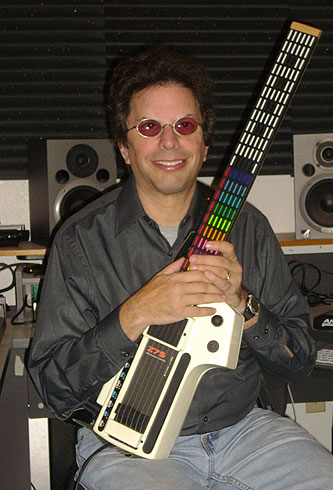 mwe3:
What do you do to relax and stay healthy in today’s crazy paced
world?
mwe3:
What do you do to relax and stay healthy in today’s crazy paced
world?
LES FRADKIN: Well, music is always relaxing for me. So that
never feels like a job. Additionally, I love to travel and Loretta
and I do that every chance we get.
Certain TV shows maintain my attention. And I love to read. I stay
healthy by watching what I eat and getting exercise and trying to
live a simple life. Of course, being on the internet is never really
simple, is it?
mwe3: Do you think we’re in for even worse times or will
we ever find a breakthrough for evolution of the human race?
LES FRADKIN: Could go either way. I always hold out the hope
that God's hand will intervene.
mwe3: You mentioned some live performances or other plans you
have coming up in Nashville? What’s your connection to Music
City these days?
LES FRADKIN: My connections are 1) Mid Tennessee Music has
been very supportive with interviews, press, etc. I'm also one of
the Top 10 finalists in the Cigna Health Spring Silver Stars 2013
competition. It's a sort of American Idol for those over 60. The finals
take place at the Ryman Auditorium on Sunday, October 20, 2013. I'll
be playing "Lift Off" solo on the Ztar on that live show.
There's a lot of great talent on that show. I certainly hope to win.
You can view my audition on You Tube here: (Les
Fradkin - Cigna/Health Spring Silver Stars 2013 Finalists).
 mwe3:
So what have you planned, as far as musical activities go for the
rest of 2013 and into ‘14?
mwe3:
So what have you planned, as far as musical activities go for the
rest of 2013 and into ‘14?
LES FRADKIN: I have no idea what I'll do next. I do intend
to perform live shows with the Ztar and that schedule is increasing
as we speak. Next? Just keen to keep improving as a musician, composer
and as an artist. I do feel that the Suite For Ztar and Orchestra
is the best CD of my career. Hopefully, your readers will agree.
Thanks to Les Fradkin @ www.LesFradkin.com



